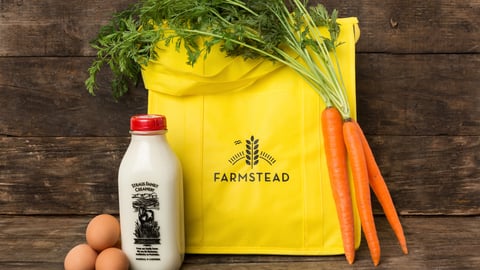Imperfect Foods Expands Sustainability Commitment to Operations
Online grocer Imperfect Foods has pledged to accelerate its plans to become a net-zero carbon operation by 2030 ahead of other major retailers by applying its sustainability mission inward to its operating model.
“Sustainability is at the core of everything we do at Imperfect Foods, but we know we can do more to drive change," said Imperfect Foods CEO Philip Behn. "To further our fight against climate change, we are committing to be operationally net zero. We want to empower consumers to make better choices and know that the shopping decisions they're making have a direct impact on the health of our planet."
In 2020 alone, Imperfect Foods' last-mile delivery emitted 12,800 fewer tons of CO2 than trips to traditional grocery stores — the equivalent of taking 2,800 cars off the road for a year — purchased 7,921 tons of post-consumer recycled packaging, and saved 52,263,090 pounds of food.
To ensure that each internal process now ladders up to an operationally net-zero carbon business model, Imperfect Foods’ updated commitment includes:
- Waste Elimination: Imperfect Foods is working to mitigate waste at every point of its business. In addition to furthering its mission to rescue 1 billion pounds of food by 2030, the brand will have its first facility certified zero-waste-to-landfill operational by 2022, with a total of six certified zero-waste-to-landfill facilities in operation three years later.
- Renewable Energy: Imperfect Foods is working toward converting all six of its fulfillment centers to 100% renewable power by 2026. Last year, the company began this transition, converting its largest fulfillment center in Los Angeles to be entirely solar powered, which is the equivalent to removing 470 cars off the roads for an entire year. This mission extends beyond fulfillment centers, with the goal of having a fully electric vehicle fleet by 2027.
- Operational Efficiency: By 2022, Imperfect Foods will increase and improve its regional sourcing by 15% to reduce the number of trucks on the road moving food, continuing to deliver orders once a week to each ZIP code they serve to limit carbon emissions.
Imperfect Foods said that this increased call to action is in response to the soon-to-be insurmountable threat that the waste and energy use of the food industry poses to the environment, noting that the food system currently accounts for 24% of global greenhouse-gas emissions.
"We partnered with Watershed, the leading software platform for running a world-class climate program, to measure our carbon footprint so we know exactly which parts of our business emit greenhouse gases and from there, redesigned our business operations to reach our goal," added Imperfect Foods Head of Sustainability Maddy Rotman "We've already done a tremendous amount of work to source our products sustainably, but the time has come for us to bring that same rigor and mission-driven focus to our operating model. The grocery industry's effects on climate change are undeniable, which was illuminated in our trend report findings, and this commitment is a crucial next step in leading the industry forward."
Founded in 2015 with a goal of eliminating the 40% of food thrown away in the United States each year, San Francisco-based Imperfect Foods began by sourcing ugly and surplus produce that didn't meet conventional grocery store standards, and delivering it directly to customers' doors. Imperfect Foods has since expanded its categories and distribution to include everyday grocery and pantry items to create an even bigger impact on the food system, partnering with growers and producers that share in share in their mission.
The online grocer achieved triple-digit growth in 2020 over the year prior, and exited the year with a revenue run rate in excess of $500 million. In January 2021, it received a commitment to fund $95 million in a Series D growth investment.





